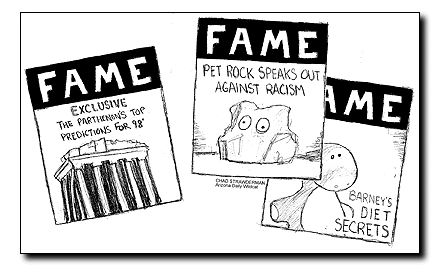![]()
![[ OPINIONS ]](/images/fall97/opinionsf97.gif)
![]()
By Bradford J. Senning
Arizona Daily Wildcat January 23, 1998
Fame blows
![[Picture]](04_3_i.gif)
Bradford J. Senning |
It's 9:30 A.M.
I'm sitting in a dimmed lecture hall that swoons with the tired nodding of 500 students. I write with quiet intent my mission for today: "Do not laugh at the teacher's lame jokes. It only encourages him."
Then he presses a button on his remote slide advancer and an aerial image of a crumbled temple illuminates the screen. "This," he says, "is the Parthenon - the most famous of the Greek temples."
Famous. He wasn't joking.
I don't question the man who would use the word "famous" in front of a lecture hall of 500 slack-browed students whose defining physical aberrations include on their faces the sheet marks of the bed out of which they just fell. "Fame" is one of those red-letter words that says to its audience, "Wake up and put me in your notes." But I question the word "famous" as a superlative to refer to anything whose significance transcends its fame.
Let's think of fame as a purple dinosaur by the name of Barney. Who hasn't heard of Barney? He's famous! Or the Energizer Bunny. By Jove, his fame has made battery-goers everywhere want to kill every last bunny dead. Or Princess Diana, whose altruistic work to rid the world of land mines and fill the world with tabloid waste made her death a celebration of flashbulbs that blinded every unblinking eye to the death of Mother Theresa (who didn't attempt the land mine gig).
One of the problems with the word "famous" is that people or things can achieve fame and still suck. Bob Euker is a case in point. One of the worst players to ever grace the game of baseball, as a lampoon he was offered a long-running stint as a spokesperson for Lite Beer. He went on to star in a sit-com, but never lost his connection with baseball. To this day his is one of those names you hear the broadcasters mention,as if he was some kind of big-shot. "Bob Euker is in the stands today."
Should we group Bob Euker and the Parthenon in the same category? I don't even want to see Bob Euker and the Parthenon in the same city. The Parthenon was a singular architectural and political achievement. Bob Euker could barely hit a baseball. The Parthenon housed an ivory and gold statue of Athena some forty feet in height, designed by Phidias, one of the great sculptors of all time. Bob Euker couldn't handle acurve-ball.

"Fame" should be one of those words we save for situations of irony, so that when we say such-and-such is "famous" we also mean that such-and-such got that stature illegitimately. The pet rock is famous. Ted Kaczynski is famous. The Spice Girls are famous.
Fame is a creation of the media, defined only by its coverage. It means that the famous thing is popular, so that popularity breeds itself by telling us that the famous thing is worth paying attention to because it's popular. If humans procreated like fame does, they'd get arrested for incest.
Things of historical significance don't belong in the red-light district of fame.
I'm not digging any new ground here. A seventeenth century playwright wrote, "Fame blows." I think that captures both the irony and the position of. Of course, it was Shakespeare who wrote this. Maybe you've heard of him. A professor of mine said he's famous.
Bradford J. Senning is a junior majoring in American literature and creative writing. His column, "The Emperor of Ice Cream," appears every Thursday.



